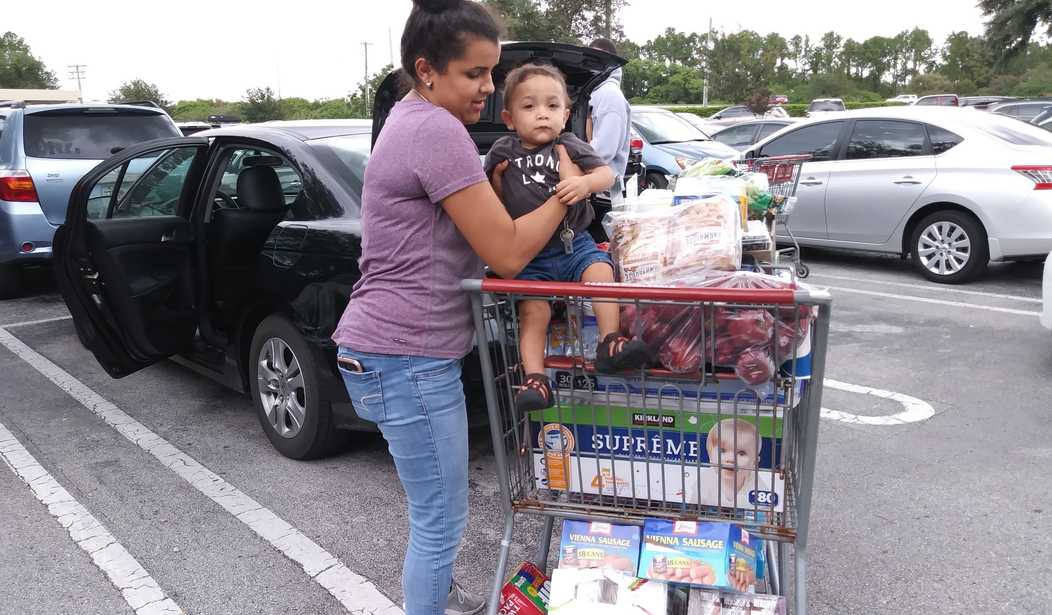Consumer inflation remained stagnant in July, hitting an 8.5 percent year-over-year growth rate, dipping slightly from June's 9.1 percent year-over-year growth, as prices for fuel decreased in July below their all-time highs hit earlier this summer — another sign of a slowing economy grappling with a recession.
So while cooling inflation to one of the big three indices — food, fuel, and shelter — will bring some welcome relief to Americas, two-thirds of the essentials are still seeing rising prices that have so far gone unaddressed by the Biden administration.
By the numbers, the gasoline index dropped 7.7 percent in July — yet is still 44 percent higher in the last 12 months — but the electricity index edged up 1.6 percent in July that means Americans are paying more than 15 percent more for electricity in the last year, the largest annual increase since February 2006.
Another month of high inflation under Biden.
— Jacki Kotkiewicz (@jackikotkiewicz) August 10, 2022
Overall CPI: +8.5% since last year
Gas: +44%
Fuel Oil: +75.6%
Meat, Poultry, & Fish: +9.3%
Milk: +15.6%
Eggs: +38%
Baby Food: +15%
Coffee: +20.3%
Public Transportation: +19%
Airline Fares: +27.7%
Real Average Hourly Earnings: -3%
Overall, the energy index is up more than 32 percent in the last 12 months and, despite a decrease in the cost of fuel oil in July, that cost is up 75.6 percent over the last year — a cost that's largely unnoticed in the summer months but will be another energy pain-point on Americans as temperatures grow colder this fall and winter.
Meanwhile, the food index rose more than one percent in July and the prices Americans pay for food overall are up 10.9 percent in the last year — the largest annual increase since May 1979. The cost for food at home is still up more than 13 percent in the last year, that metric's largest increase since March of 1979.
Recommended
Shelter increased 0.5 percent in July as the cost for Americans to keep a roof over their head rising to 5.7 percent over the last year. Apparel costs also increased more than 5 percent in the last twelve months.
July's jobs report showed wage growth at 5.2 percent in the previous twelve month, a number that still trails inflation and means American are being forced to make ends meet while taking a 3.3 percent cut to their real wages.
Here’s the inflation vs wages chart for July 2022. Nice to see a bit of a dip in the top line inflation rate — but the gap between inflation & wage growth continues to leave American families further behind each month. More government spending is not the answer. It’s the problem. pic.twitter.com/U1Z096ZdpD
— Andy Puzder (@AndyPuzder) August 10, 2022
So while the Biden administration is sure to take a victory lap on the barely cooling top line inflation number, they'll be ignoring the indices that showed inflation continuing to hit 40-year highs and the gap between wage growth and inflation. Their celebration comes at the ignorance and expense of Americans who are living paycheck-to-paycheck, but they clearly don't know or care about what the people are dealing with.
And remember, the Senate just passed its massive "Inflation Reduction Act" that has been shown to do exactly nothing to ease inflation but instead will raise tax bills and throw more taxpayer funding at useless so-called "green" energy special interests — thereby increasing costs for Americans.
??????????????
— Comfortably Smug (@ComfortablySmug) August 10, 2022
8.5% inflation!!
Libs will try convincing you this isn't bad, but remember, they just passed a massive spending bill to throw even more fuel on this fire https://t.co/bEp5gdQXEZ
July's consumer inflation read is likely to be a key indicator for the Federal Reserve's decision on interest rates next month, along with July's jobs report. The Fed could announce another 75-basis-point hike to its key rate if it thinks the economy isn't slowing quickly or drastically enough, or they could back off to a .50 increase if they think a soft landing for the U.S. economy — that already hit the definition of a recession — is somehow still possible.
























Join the conversation as a VIP Member